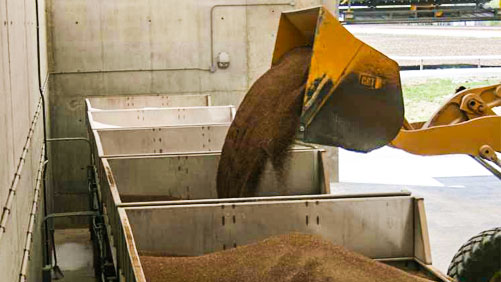Fertilizer Industry: TFI’s Strategic Plan Helps Address Key Issues For 2015
 The mission of The Fertilizer Institute (TFI) is to represent, promote and protect the fertilizer industry. To ensure this mission is met with maximum effectiveness, TFI has engaged with its members to create a strategic plan that provides a road map for addressing the important issues impacting the fertilizer industry, as well as the resource TFI needs as it undertakes these activities.
The mission of The Fertilizer Institute (TFI) is to represent, promote and protect the fertilizer industry. To ensure this mission is met with maximum effectiveness, TFI has engaged with its members to create a strategic plan that provides a road map for addressing the important issues impacting the fertilizer industry, as well as the resource TFI needs as it undertakes these activities.
A cornerstone effort of TFI’s strategic plan is ResponsibleAg. In order to ensure that all fertilizer retailers in the U.S. have tools and resources to comply with all applicable federal regulations, we have partnered with the Agricultural Retailers Association to form ResponsibleAg. Registration officially opened in December for businesses to sign-up for assessments, which are set to begin in 2015. ResponsibleAg provides participating businesses a federal regulatory compliance assessment relating to the safe storage and handling of fertilizers. After the assessment, participating retailers will receive a Web-based list of recommended corrective actions along with a robust suite of resources to assist them in addressing any issues identified in the assessment.
“Participating in the program will help assure community members, employees and emergency responders that participating agribusinesses are acting responsibly,” said J. Billy Pirkle, senior director of environmental, health and safety for Crop Production Services and chairman of ResponsibleAg. “By improving safety and security associated with storage and handling of fertilizer products, supporting compliance with federal regulations, demonstrating accountability and transparency, and providing for the safety of employees, customers and communities retailers will be able to continue serving the vital need of the agricultural community for crop nutrients.”
Other Initiatives
In addition to ResponsibleAg, TFI is also focused on sustainability and stewardship. The fertilizer industry faces multiple risks relative to food supply chain involvement in sustainable fertilizer use. These risks are related to: Inappropriate nitrogen rate reductions in core markets; lack of science available to support our actions; inaccurate quantification of emissions and environmental impact resulting from fertilizer practices; lack of knowledge by food supply chain stakeholders; negative messaging regarding fertilizer use; and insufficient 4R implementation by farmers and their advisers.
To address these challenges, TFI is working toward expanding available science to support our actions and initiatives, better defining sustainability metrics regarding fertilizer use, increasing knowledge among supply chain stakeholders regarding fertilizer practices, reducing negative messaging regarding fertilizer use and increasing acceptance of industry engagement by growers and commodity organizations.
In the coming year, we will continue to engage with several traditional and non-traditional partners to enhance stewardship efforts and to bring the fertilizer industry into the national discussion about sustainably produced foods.
The role of fertilizers for increasing ag productivity is key to global food security and for increasing yields on existing arable land, thus preserving forests and biodiversity. As such, fertilizers associated with good ag practices are necessary components of climate-smart agriculture. TFI has joined the International Fertilizer Industry Association (IFA) and the International Plant Nutrition Institute (IPNI) as members of the Global Alliance for Climate Smart Agriculture. The alliance was recently formed to help governments, farmers, scientists, business and civil society, as well as regional unions and international organizations, to improve agricultural practices, food systems and food policies to address climate change and promote the efficient use of natural resources.
4R Certification Program
Despite the many actions farmers have taken to improve soil health and reduce fertilizer run-off, nutrients leaving fields and entering streams and lakes continue to contribute to water quality problems. The 4R Certification Program in the Western Lake Erie Basin, launched in March 2014, encourages ag retailers, service providers and other certified professionals to adopt proven best practices through the 4Rs, or using the right fertilizer source, at the right rate, at the right time and in the right place. This provides a science-based framework for plant nutrition management and sustained crop production, while considering specific individual farms’ needs. So far, three retailers have been certified, with more signed up to participate in the auditing process.
Advocacy
Up and down the fertilizer supply chain, the public policy decisions being made in Washington, DC, can impact business. Engagement in the political process is a key part of ensuring that the voice of fertilizer is heard not only in the nation’s Capitol, but also in the states and local communities. These issues include clean air, clean water, waste, safety and security, climate change, energy, transportation, sustainability and stewardship.
To be effective in issues advocacy, TFI has developed a new advocacy plan that identifies tactics, objectives, and strategies to help streamline TFI’s public policy efforts and to focus the associations’ and members’ limited resources. TFI is also working on implementing a new governance structure that will help TFI’s committees focus on priority issues.
TFI is also working to strengthen our grassroots and political muscles. No matter where you sit in the distribution chain, TFI encourages you to get involved and become an effective advocate for your industry.
To help, TFI is excited to offer a new Web resource called FERT Action to help effectively advocate for the fertilizer industry. This Website does not endorse any specific political candidates, parties or causes. Instead, it provides you and your employees with the resources and tools you need to become educated and involved. The resource can be found at www.tfi.org/fert-action.





